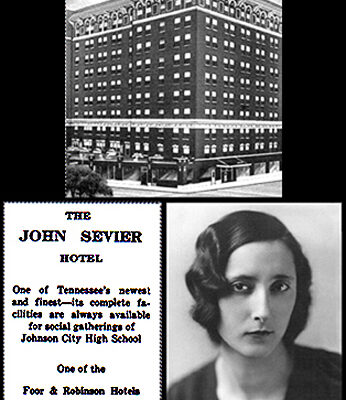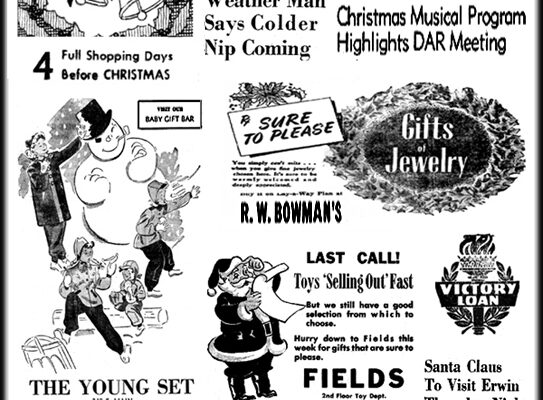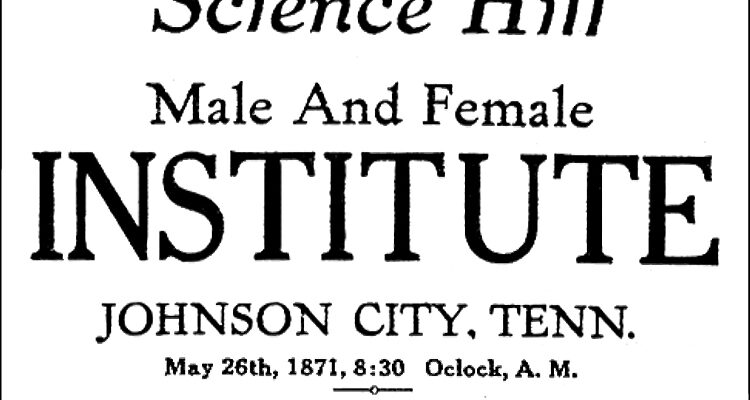annually
Stella Lent Recalls the Years She Worked at the John Sevier Hotel
Local historian Alan Bridwell interviewed Stella Lent who fondly recalled the years she lived in Johnson City and her love for working at the John Sevier Hotel.
The 99-year-old resident was born in 1911, the same year as the Titanic tragedy. She and her family arrived in Johnson City in 1928 by train from Beckley, West Virginia and rented a furnished house on Whitney Street from Dr. Carroll Long. Ms. Lent later worked at People’s Drug on Main Street for several years.
Between 1943 and 1963, she was employed at the John Sevier Hotel. She spoke highly of Harry Lee Faw (on whose land the hotel was built) and his wife, Katherine. The old Faw home place later became a boarding house before being demolished to make room for the hotel.
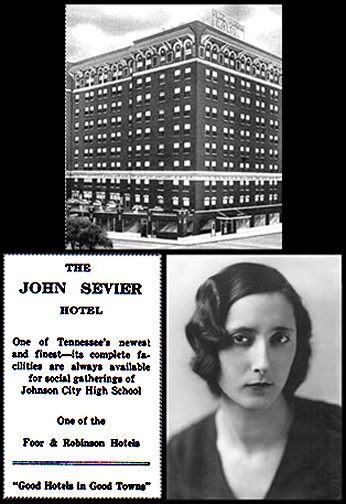
Initial plans were to construct the hotel in three phases beginning on the north (Southern Depot) side and finishing at the south (Market Street) end. The first phase containing 130 rooms was constructed in 1924. The second phase that added 100 additional rooms was under construction when the Lent family arrived in the city. The third addition was never built. Entrances to the long lobby were on Market Street (south), Roan Street (east) and Fonde Circle (north).
Initially, the hotel rooms were very basic with no frills such as radios, televisions or air conditioning. Stella recalled that room rates were varied: $2.50, $3.00, $5.00 and $8.50 per day. Each had a private bathroom with small tiles on the floor.
Guests had access to a separately owned 110-car parking garage along the west side of the hotel owned by a Mr. Fields. Although there were no covered walkways interconnecting the hotel, train station or garage, passengers could exit the train and be within a short walking distance of the hotel. Bellhops known as “red hats” patrolled the area between the hotel, garage and train station to assist travelers with their luggage.
Ms. Lent recalled that Eleanor Roosevelt lodged at the hotel on three separate occasions, always arriving by train. She conversed with the First Lady on each visit. During one trip, she and her sister went to Soldiers Home and chatted with the special guest about the subject of infantile paralysis, which had infected the president and Stella’s sister.
When Stella was asked if she heard any stories about Al Capone staying at the hotel, she responded with a strong, “Oh yes!” She based her information on comments related to her from a reliable bellboy who was working there when the gangster and his entourage arrived in 1927. He told her that they rented the entire third floor. They were always very polite, caused no trouble during their stay and left the rooms in the same clean and orderly condition as when they arrived. Stella remembered when the city was called Little Chicago. Downtown merchants often utilized a “door shaker,” a police officer who walked the streets after hours checking each business establishment’s door to ensure it was properly secured.
The old Faw Spring, which had previously been a favorite resting stop for travelers and their horses in the early days of the city, became an aggravation for the hotel after it was built because water had to be continually pumped out of the basement sump. Occasionally, a pump malfunctioned, causing water to flood the basement. Stella said the water would sometimes be ankle-deep in her first floor office.
It was standard procedure for people to make reservations before arriving at the hotel. Sometimes, patrons would stop in for a room only to find that there were none available. The hotel stayed full throughout the war years. Rooms were held until 11 p.m. after which time they were removed from reservation, unless the arrival time was confirmed with the reservation desk clerk.
A humorous incident once occurred concerning room 1820, which had three single beds in it. A man showed up at the desk and requested a room. Since the people reserving it had not arrived yet and it was approaching 11 p.m., the man repeatedly demanded that he be given the room. When Stella refused, he threatened to call his good friend, Judge Samuel Cole Williams to influence her to give him a room. Stella responded, “When you call him, let me speak to him because he is deceased.” That abruptly ended the argument.
Ms. Lent said that the hotel strived to maintain a good reputation by strictly forbidding gambling, prostitution and drunkenness. If hotel management suspected questionable behavior in a room, they checked it out. Sometimes a fight broke out prompting a call for the police to restore order. The hotel maintained a “black list” of people who were not permitted to stay at the hotel because of previous problems She said some well-known residents were on the list.
Stella loved to work on the hotel’s switchboard, which she deemed was a “great experience.” It consisted of a two position Kellogg board with two rows of jacks directly opposite each other. “When a signal came on,” she said, “the operator could answer on either set, but the rule of thumb was to use the back jack for all guests requesting an outside call. We stayed busy when we worked the switchboard. We had three telephone booths; one was the house phone and the other two were pay phones. Somebody would come up and ask me to ring someone’s room, but we were not permitted to pass along calls from people walking in off the street.”
Despite her age, Stella Lent’s sharp memory and quick wit provided added interesting facts about a once prominent “skyscraper” in downtown Johnson City.
East Tennessee Pioneers Had Their Share of Hard Work, Recreation
Life for early East Tennessee pioneers was comprised of chopping down trees, building log houses, clearing fields and sparring with Indians. This left little time for recreation and other leisure activities.
Their hardship caused them to take life too seriously with little time for frivolity. These Scotch-Irish inhabitants were initially comparable to the Puritans of New England who abstained from most forms of amusement.
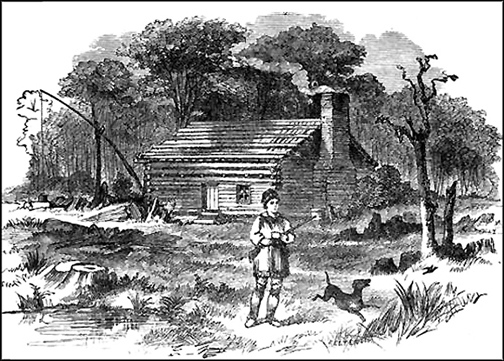
However, after the settlements became more established and Indian conflicts became less of a threat, the settlers began interspersing a dose of leisure activities into their physical labor. They began engaging in a variety of amusements such as log rolling, corn husking and quilting bees, to which everybody in the community was invited to participate. Dinners and suppers on the ground became routine. In areas where fine horses were raised, the inhabitants participated in the sport of horse racing.
Not to be left out of the festivities were nightly dances that consisted of reels, minuets, jigs and breakdowns. The music was usually provided by a couple of backwoods fiddlers who played a variety of curious old tunes with unusual titles (“Bug in the Taters” and “Old Aunt Jenny with Her Night Cap On”). The musicians were rudimentary fiddlers, not refined violinists. Therefore, the selections were not found in any formal music book. A music stand containing sheet music was nowhere to be found.
The season of particular fulfillment to the settlers was Christmas. In celebrating this special holiday, our ancestors continued the traditions of the older Southern colonies. Everybody sought to generate some type of noise. Therefore long before the sun came over the hills, settlers were frequently aroused from peaceful slumber by neighbors firing volleys from their rifles. Children and occasionally older people dropped in on their neighbors to get or exchange Christmas gifts. It was a happy occasion.
Children did not receive beautiful toys and books for the season, as did those of later generations. There were no Christmas trees in the homes and little, if anything, was said about Santa Claus. Everyone enjoyed the holiday in his or her own simplistic way. The boys received board sleds, bows and arrows and blowguns, which their fathers had made for them. For amusement, young men of the neighborhood engaged in pranks such as carrying away gates. One popular trick was to disassemble a wagon into individual pieces, carry them to another location such as at the top of a barn or in the fork of a tree and then reassemble them to the visible consternation of the vehicle’s owner.
Foxhunting was greatly enjoyed especially by those who owned packs of hounds. There were two species of foxes that roamed the area, red and gray. The hunters usually went out on the chase late at night after the fox had time to travel about the countryside. When the animal’s scent was finally detected, a chorus of baying dogs serenaded the countryside to the delight of their owners. It might take until the next afternoon or later before the animal was caught. While in pursuit, the red fox ran a straight distance without changing direction, but the gray fox repeatedly circled around its den.
At school, boys played “town ball,” “bull pen,” “cat,” “prisoner's base,” “marbles” and “tops.” Tops were hard to find so some boys “danced” small gourds for tops with the object of having the last top in the group spinning. Girls played such games as “My Chicken, My Crane, Or My Crow” and “Old Granny Melinda.”
Life on the frontier was certainly difficult, but our hardy East Tennessee ancestors managed to incorporate much needed merriment into their hard working lives.
Christmas 1945: A Mixture of Holiday Joy, Cold Weather, War Recovery
Margaret Hougland recently mailed me some old newspapers, including one dated Wednesday, December 19, 1945. My column today is a summary of local news from that holiday paper.
One dispiriting bit of news was that 82,000 homebound soldiers across the country faced the possibility of being stranded in West Coast ports during Christmas unless jammed rail facilities were cleared. Three Johnson City men were said to be heading home: Shipfitter Third Class Max Brandon (aboard the USS Rudyard Bay, USNR, husband of Mrs. Mary S. Brandon), Sgt. James Gillespie (traveling on the USS Celeno, husband of Mrs. Lacinia Gillespie) and Sgt. Gordon E. Kendall (on the USS Marine Adder).
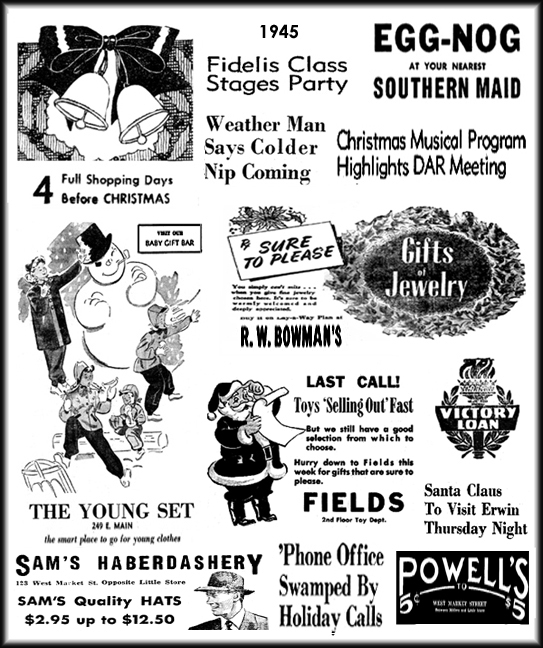
“Much colder” was the weather prediction after a wintry artic blast blanketed the countryside with two inches of fresh snow. Washington County schools dismissed at the close of Tuesday’s classes. A large volume of telephone calls forced the Inter-Mountain Telephone Company to issue a plea to residents to use the phone sparingly and to limit calls to only those necessary. On Tuesday, the company handled 72,806 local and 1,400 long distance calls.
Captain Don Vendeville, commanding officer of the Salvation Army citadel, announced that lists for grocery orders and cards would be closed Wednesday evening for delivery to needy families on early Thursday morning. Each package, based on the number of family members, contained a complete holiday dinner.
Representatives of various area churches of Johnson City participated in carol singing around the community Christmas tree on Fountain Square. Weather conditions on the previous night prevented choirs from the Church of God and the Salvation Army from participating.
The tenth annual children’s Christmas party given by Gloria Rayon Mills was held at the Municipal Auditorium (corner of W. Main and Boone). Several hundred employees and their families attended the event, which had become a Yuletide custom. Approximately 360 colorful gift shopping bags filled with fruit, candy and four different toys were presented to children who were 10 years of age or younger and whose parents worked at the plant. Also included were children whose fathers were on military leave from the mill. Children from Bernard School were invited to appear on the program.
On Tuesday, Christmas music was presented to the Rotary Club by the music department of East Tennessee State College under the direction of Dr. M.E. “Montie” Butterfield. The newspaper also provided particulars of numerous organizations holding Christmas events: Central Baptist Church’s Fidelis Class, Monday Club Auxiliary, Thirty-Niner Club, Theta Alpha Chi (Elizabethton School of Business), John Sevier Chapter of the DAR, Juvenile Music Club, Young Farmers and Homemakers Club, Junior Music Club and several others.
Several businesses placed ads in the newspaper: Fuller-Fields Co. (office machines), Penney’s (quick tips for late shoppers), The Chocolate Bar (lunches at 30, 35 and 40 cents), Nelson’s Jewelry Stores (“Home of Blue White Diamonds”), Powell’s Dept. Store (popular W. Market Street firm), Feather’s Furniture Co. (new and used furniture), Fields (on Fountain Square), R.W. Bowman Jewelry (121 W. Market), U.S. Loan Office (“Pay Cash and Save Dollars”), King’s Dept. Store (five big floors of shopping), and The Little Stores (beef roast priced at 27 cents/lb.).
Actress Bette Davis and her husband spent Monday night in Kingsport for a Christmas shopping spree. “We wanted to stop here,” she told a reporter, “because we heard that Kingsport was a charming and progressive city.”
Thanks to Ms. Hougland for affording us a nostalgic glance back to Christmas 1945.
1921 Chronicle Article Claimed Rev. Samuel DeBusk Was SHHS Founder
The Sunday, July 3, 1921 Johnson City Chronicle identified a Samuel DeBusk as being the founder of Science Hill High School when it opened on Aug. 24, 1868. While I have heard of this person, I never associated him in the context of their being the founder of my high school.
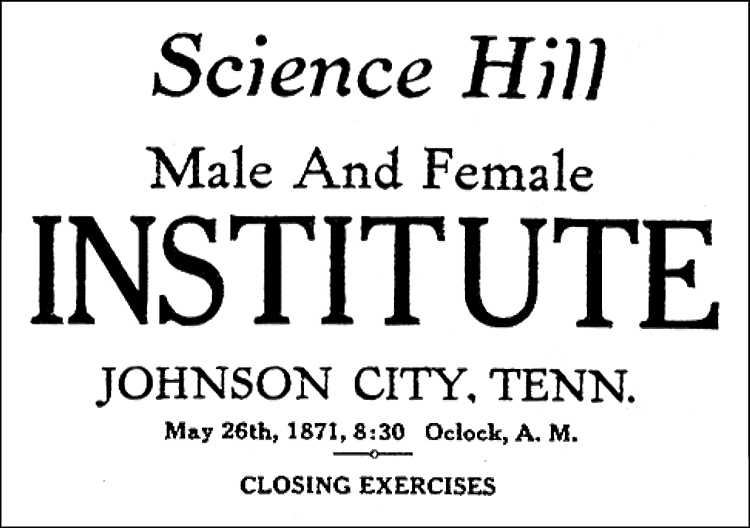
The population of Johnson City in 1871 at the time of the first graduation was scarcely 400 inhabitants. Main Street was an open field playground and Roan Street was nowhere to be found. The surrounding landscape along Watauga and Unaka avenues as well as Southwest Addition were densely wooded areas without so much as a hint of a road.
The little village that would grow up to become the imposing city that we know today was centered on Market Street at the location of the railroad tracks on Fountain Square. It was at this same locale that city founder, Henry Johnson, built his first house, store and train depot.
According to the Chronicle, at that moment in history, Rev. Samuel W.J. DeBusk, a Methodist minister and graduate of Emory and Henry College, came here and with the help and support of Thomas A. Faw, Tipton Jobe and a few other leading citizens of the time reportedly founded Science Hill High School. The modest facility eventually became the mother of Johnson City’s educational institution.
Facts concerning the early clergyman come from Judge James W. Crumley who provided the Chronicle with the story and an 1871 graduating exercises program. I wrote a “Yesteryear” column detailing that document on 9-29-2008. The program makes no mention of Rev. DeBusk.
According to Crumley, the preacher, a quiet and unassuming lad with a great ambition for education, was the son of a poor family from southwest Virginia. His desire to enroll at Emory and Henry College was clouded by financial impossibility. However, through the guiding of his mother, he enrolled at the school. During his enrollment there, his mother was always in the shadows assisting her son by carrying food to him three times a week and giving him the few pennies that she had saved.
Upon completion of his college studies, DeBusk had achieved a superior scholastic record, but he lacked enough money to pay his diploma fee. He addressed the dilemma by entering an oratory contest and won top prize, which included the Robinson Prize metal. This allowed him to pay his debt with the school.
At E&H, it was customary for the victor to publicly hang the medal about the neck of his sweetheart. When DeBusk won, the crowd exploded with applause but became quiet when the prized medal was placed in his hand. Everyone wondered which fortunate lady would be chosen as the recipient. He walked down the platform to the rear of the room where he singled out a plain looking countrywoman with a checked sunbonnet tied to her arm. Taking the woman by the hand, he drew her to her feet, and proudly hung the gold emblem of distinction around her neck. His sweetheart fittingly was his hard-working mother.
Later, DeBusk brought his mother with him to Johnson City where she became a teacher in the lower grades of his school. He also brought his brother-in-law, Wylie W Smith, and brother, William, with him. They attended Science Hill and later graduated from Emory and Henry College. In time, DeBusk married a Smith lady from Southwest Virginia.
If anyone can provide additional information to authenticate or refute the Chronicle’s claim that Samuel DeBusk was the founder of SHHS, I would like to hear from you.
